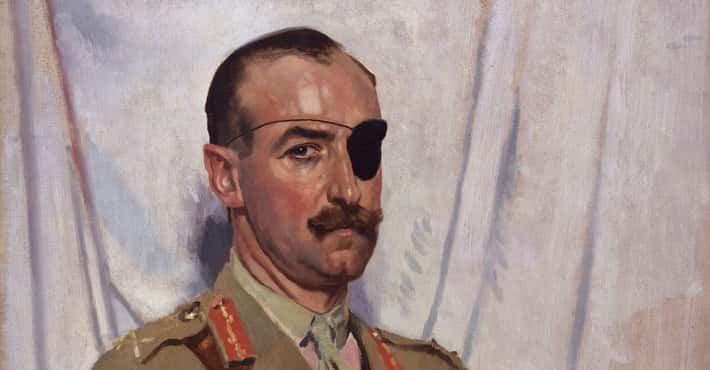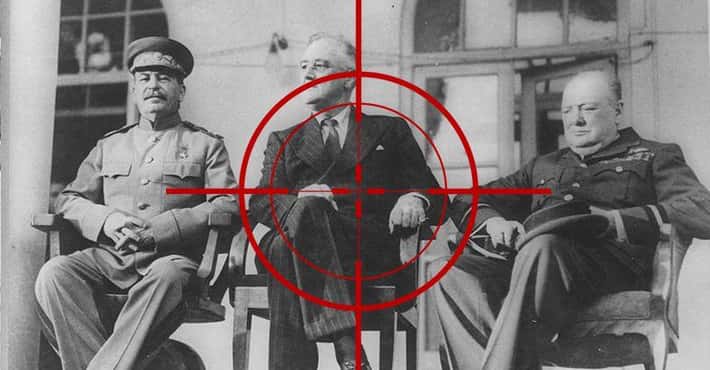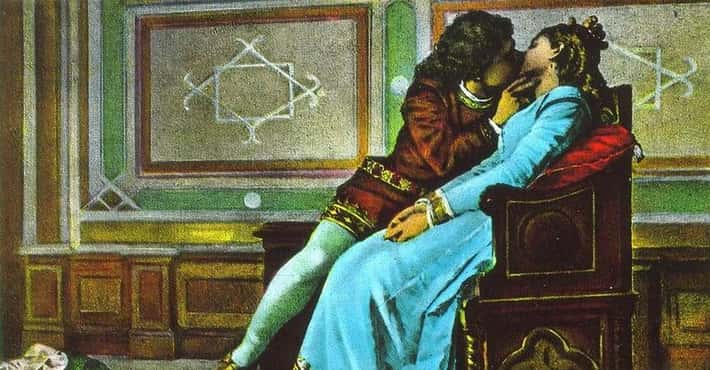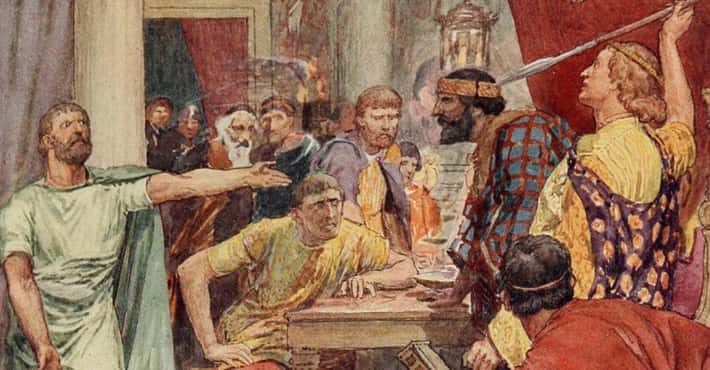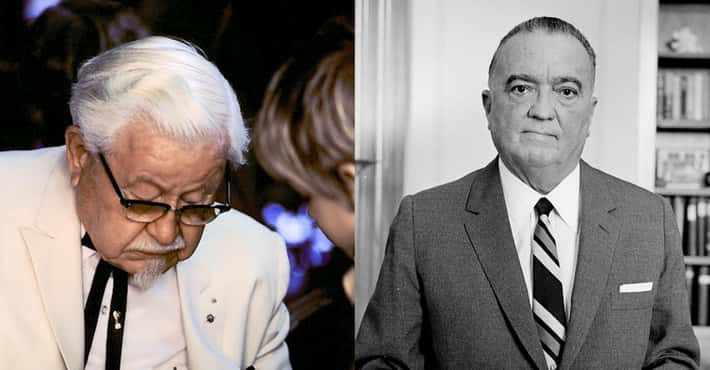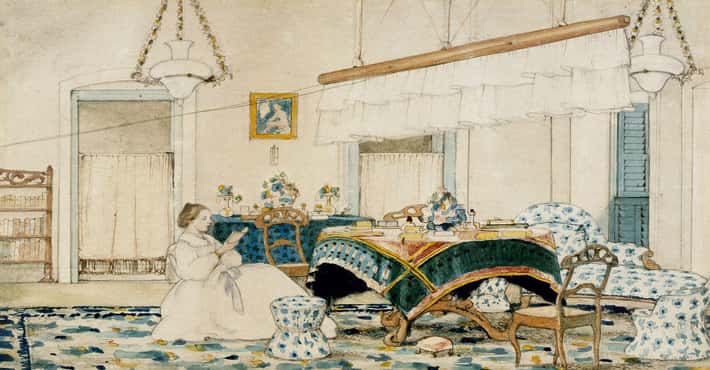10 Historical Backstabs That Backfired Big Time
Vote up the most fitting fates
If you come at the king, you’d best not miss, and if you do succeed, you’d better be ready to look over your shoulder for the rest of your days. Even when a conspiracy to topple a king actually succeeds, that doesn’t mean things worked out for the perpetrators. Regicide often comes with unforeseen costs.
This collection looks at the times when historical backstabbers got way more than they bargained for.
- Photo: Tony Querrec / Wikimedia Commons / CC-BY-SA 4.0
By the 5th century CE, it’s fair to say the Roman Empire had seen better days. Or at least the western portion of it; the east still had plenty of life in her yet. Beset by barbarians, corruption, and famine, the empire was ripe for plunder. Enter the fearsome warlord Attila.
The Hun king swept through western Europe ransacking what is now France. The incursion was halted by a coalition of Visigoths, Saxons, Alans, and Romans led by the Roman general Flavius Aetius at the Battle of the Catalaunian Fields in the summer of 451 CE. He just about held off another Hunnic incursion into Italy the following year.
Flavius Aetius’s reward for his stellar service to Rome was treachery at the hand of the emperor Valentinian III. Believing Aetius intended to place his son on the throne in the place of Valentinian’s firstborn, the emperor hatched a plot to slay the last great Roman general. He summoned the general before him and accused him of trumped-up charges of drunkenness and insubordination, which Aetius naturally denied. Valentinian and a court chamberlain Heraculis killed the general. When the emperor ruminated on the act, according to one source, a courtier apparently said to him:
You have just cut off your right hand with your left.
The ominous prediction held true, for Valentinian’s days were numbered. Less than six months later, two of Aetius’s subordinates got their revenge on Valentianian and Heraculis. Right in the middle of the city, at the Campus Martius, the two men attacked and killed the emperor and his chamberlain in broad daylight. The numerous guards posted nearby didn’t lift a finger to aid Valentinian.
- Photo: 300 / Warner Bros.21,588 VOTES
You probably know him from his portrayal in the movie 300 as the severely deformed Spartan who seeks acceptance from his peers. When he’s rebuffed by Leonidas, Ephialtes turns his crimson cloak to a black one and leads Xerxes’s men around a hidden pass to flank the Spartans. While elements of that story are true, much of it is simply made up for the movie (hardly the only point of deviation from history in that picture).
The real Ephialtes wasn’t a Spartan, nor was he disfigured - at least the sources don’t make any mention of it. The simple truth was that he was an otherwise unremarkable individual who spotted a chance to get rich quickly at the expense of his fellow Greeks.
As in the movie, he approached Xerxes with his offer and led a portion of the men around the Greek army to secure victory. In the film, a disappointed Leonidas says of the treachery, “You there, Ephialtes, may you live forever.”
In a certain sense, he did. Today the word ephialtes means “nightmare,” a reference to treachery unforgotten many centuries later. But his mortal life didn’t last much longer.
His hopes of riches were dashed when the Persian fleet came a cropper at Salamis and the shattered expedition was finished off at Plataea. Fearing retribution for his deeds, he fled north to Thessaly but a price was put on his head at a gathering of Greek leaders at Pylai. He was finally slain at the hands of a man named Athenades, not actually in relation to the bounty on his head. Nonetheless, the grateful Spartans still rewarded Athenades.
- Photo: Total War: Three Kingdoms / Sega3549 VOTES
Lü Bu Ran Out Of Friends To Betray
Lü Bu was a legendary ancient Chinese general and warrior whose martial skill was matched only by his capacity for betrayal. During the Three Kingdoms period, he was one of several warlords vying for control in the wake of the Han Dynasty's collapse.
The actual historical sources for his life were penned much later and haven’t yet been fully translated into English. Much of his story comes from the 14th-century novel The Romance of the Three Kingdoms, a dramatized version of the events. So this is very much an item that should be taken with a hefty pinch of salt.
Lü Bu cut his teeth as an officer in service of a magistrate named Ding Yuan. He became the adopted son of Ding Yuan, but when the powerful warlord Dong Zhuo came onto the scene, Lü Bu jumped at the chance to betray his adopted father in exchange for the best horse in the land and a place at Dong Zhuo’s side. He lopped off poor Ding Yuan’s head and became the foster son of Dong Zhuo. He served his new master well. For a while.
The novel suggests Lü Bu’s wandering eye got the better of him and an affair with one of Dong Zhuo’s maids caused a rift between father and adopted son. There’s no mention of this in the actual histories, of course, but what good is a novel without a romantic side plot? Whatever the truth, Lü Bu did what he did best - he betrayed his adopted father and killed him.
Dong Zhuo was a brutal warlord whose demise wasn’t exactly mourned across China. Lü Bu spent the next few years moving from one warlord to another. He was apprehended in his sleep by two subordinates (presumably sick of the constant shifts in loyalty) and presented to another great warlord of the era Cao Cao. When the mighty Lü Bu complained of the tightness of his bonds, Cao Cao - who was certainly no stranger to the art of subterfuge - apparently remarked that “binding a tiger must be tight.”
Lü Bu made one last plea for his life, offering to serve Cao Cao, but this was rebuffed on the advice of Liu Bei, whom Lü Bu had the unfortunate habit of calling “big ears.” Those big ears were deaf to Lü Bu’s pleas for mercy and the tiger went out with a whimper, strangled on the orders of Cao Cao.
- Photo: Medici / Netflix4802 VOTES
The Pazzi Conspiracy Backfired Spectacularly
When you think of the Renaissance, chances are the Italian city of Florence is one of the first places that comes to mind. Though a republic in name, the city was run by the powerful Medici family. Cosimo de Medici was the de facto ruler of Florence for 30 years until his passing in 1464.
The Medicis made their fortune in banking, and spent lavishly to support the burgeoning arts movement in the city. With this wealth and acclaim naturally came jealousy and a plot by a rival family, the Pazzi, to knock the Medicis from their perch.
Pope Sixtus was in on the scheme, or rather expressed approval of the removal of the Medicis from power, and pledged to work with whomever ousted them (nudge, nudge, wink, wink). The plan was really quite simple in the end - assassinate Lorenzo (the current ruler) and his younger brother Guiliano. They wanted to finish off the siblings at the same time and to strike outside the city walls, but the brothers weren’t so obliging and kept separating when the attacks were supposed to commence. After months of waiting (and discovering Guiliano wouldn't be at the feast they originally planned to strike at), the plotters decided at the last moment to attack the Medicis during Mass.
Guiliano was slain at the scene and stabbed 19 times, with Francesco Pazzi making the killing blow. Lorenzo managed to escape the sacrilegious ambush with a minor neck wound. During the attack, Jacopo Pazzi was supposed to rouse the city’s population against the Medicis but soon found the Pazzi family badly underestimated the level of public support for the Medicis. Francesco was dragged from his bed by an angry mob and summarily hung alongside several other conspirators. Jacopo fled the city but was soon captured and executed along with scores of his family. But apparently, death alone was not sufficient punishment for Jacopo.
His body was exhumed from the Pazzi family tomb and reburied outside the city walls. Some local children dug up the remains and dragged Jacopo back through the city before chucking him into the river Arno.
The Pazzi Conspiracy to destroy the Medici family backfired spectacularly. Not only did the scheme strengthen the Medicis' hold on Florence, but the surviving members of the Pazzi family were also banished from Florence. As for Pope Sixtus, the Medicis had little sympathy when he passed away a few years later, with an envoy remarking:
Today at 5 o'clock His Holiness Sixtus IV departed this life – may God forgive him!
- Photo: The Admiral: Roaring Currents / CJ Entertainment5882 VOTES
Won Gyun Was Sunk After Torpedoing A Rival's Career
Not content with unifying Japan under his banner, Toyotomi Hideyoshi launched an audacious bid to become emperor of China, beginning with the conquest of Korea in 1592. That the invading force just so happened to be comprised of tens of thousands of battle-hardened warriors just done fighting one another, was but a happy coincidence. The samurai swept through the peninsula, reaching Seoul in just 19 days. But the incursion stalled when a reliable supply route couldn’t be secured.
The cause of that breakdown? One outstanding Korean admiral named Yi Sun-sin who inflicted a series of catastrophic defeats upon the Japanese fleet. Yi’s dazzling victories were achieved with minimal losses (not bad for a guy with no prior naval experience). But with great acclaim also comes great jealousy and Yi’s position was coveted by Won Gyun, a fellow officer who was involved in a plot to remove Yi from his command.
When Yi was imprisoned for disobeying orders that would have sent his fleet into a trap, Won was handed the reigns. In his one and only naval battle as commander, he fell completely for a ruse by his Japanese counterpart and lost all but 12 of the Korean navy's warships. The hapless commander didn’t survive the battle, while Yi's allies in court managed to convince the king of his innocence.
After he was restored to his post, Yi was ordered to scuttle the few ships that remained but instead took the remnants of the fleet and won his greatest victory, despite being outnumbered more than 10 to 1. A year later, Yi perished in the final engagement of the conflict; he led from the front and was struck by a stray bullet. As he lay dying below deck, his nephew donned his armor to take his place and see out the victory.
Yi Sun-sin died a hero and his statue takes pride of place in the Korean capital. Won Gyun’s tomb is far more modest.
- Photo: Allan Gluck / Wikimedia Commons / CC-BY 4.06679 VOTES
Ptolemy Ceraunus Paid For His Scheming
The eldest son of Alexander the Great's bodyguard and later ruler of Egypt. Ptolemy Ceraunus (also written as Keraunos) was passed over for the Egyptian throne in favor of his younger brother Philadelphus who ruled as Ptolemy II.
Ceranus roughly translates to “thunderbolt” - a comment on the his impatient nature. After he was disinherited, he linked up with another of Alexander’s successful diadochi (“successors”), Seleucus (pictured), to topple yet another Alexandrian alum, Lysimachus, and claim his kingdom. After Lysimachus was vanquished, Seleucus and Ceraunus met at a temple to pay tribute to the gods and plan their next move. The impetuous Ceraunus knifed his patron in the back and claimed Lysimachus’s kingdom as his own.
To seal the deal, he offered to marry the widow of Lysimachus, his own half-sister Arsinoe (inbreeding was very much in fashion among the diadochi). She agreed, so long as her children would be spared. At the wedding ceremony, Ceraunus proved you can’t kid a kidder - even with kids involved - and had two of his nephews slain. Arisnoe fled to Egypt where she married, for a third time, her full-brother Ptolemy II.
Treachery may have won Ceraunus a crown but it didn’t help him to keep it. His underhanded ways created many enemies and few friends. He managed to fend off the initial challenges to his throne but the chaos prompted an army of Galatians (Celts who migrated to Asia Minor) to swoop in.
Ceraunus refused to lend aid to the neighboring tribes and, in doing so, signed his own death certificate. His would-be allies became enemies and joined up with the Galatian king Bolgius. Ceraunus was defeated in battle and the victorious Celts mounted his head on a spear. An ignoble end to a thoroughly ignoble career.
- Photo: 投稿者がファイル作成 / Wikimedia Commons / Public domain
In 1582 CE, the fearsome Japanese warlord Oda Nobunaga was on the cusp of unifying Japan under his banner. With news of a siege stalling in the west, he ordered one of his top generals - Akechi Mitsuhide to gather his men. With Oda staying the night in the Honno-ji temple in Kyoto, Akechi made his move. He turned on his master and overwhelmed the few retainers Oda had on hand. With the situation lost, Oda set fire to the temple and took his own life. His eldest son and heir, Nobuatda, was killed soon afterward by Akechi’s forces.
The question of why Akechi Mitushide turned on Oda Nobunaga has been debated by historians ever since. A range of motives have been proffered: Oda’s actions led to the death of Akechi’s mother; Oda was abusive towards his subordinates; his sacrilegious burning of temples demanded justice; and even that Oda had requested Akechi stop him if he become too brutal. The last one seems quite a stretch.
Perhaps the simplest explanation is the most likely: Akechi saw an opportunity to seize power and took it. The time period was rife with sudden betrayals, and Akechi’s turn was hardly the first nor the last that would take place during the Sengoku period.
With Oda Nobunaga out of the picture, it seemed like Akechi Mitsuhide was poised to finish what his master had started and ultimately become the ruler of Japan. He had but a week to enjoy his spoils for, upon getting news of Oda’s death, another subordinate swung into action.
Toyotomi Hideyoshi had come a long way under Oda Nobunaga, from a peasant who carried Oda’s sandals to his top subordinate general. Oda’s “little monkey” didn’t waste any time. He immediately ended the siege by offering very lenient terms to the castle commander and turned his army around to confront his treacherous former colleague.
Just a few days later, Toyotomi’s forces shattered Akechi’s troops at Yamazaki and Akechi fled the scene. He was slain by a bandit leader less than a month after his betrayal of Oda Nobunaga as he fled through the country.
- 8392 VOTES
Artabanus Learned Oaths Mean Little Among Kingslayers
Artabanus (sometimes written as Artapanus) was the captain of the Persian King Xerxes's personal guard and one of his most trusted advisors. After the disaster that was the Greek expedition and an expensive building program depleted the empire’s treasury, the knives were out for Xerxes.
A conspiracy involving Artabanus, Xrexes’s son-in-law Megabyzus, and a conniving court eunuch named Aspamitres formed to axe Xerxes and pin the blame on the eldest son Darius. Megabyzus was incensed with Xerxes's refusal to punish his daughter for her wandering ways while Artabanus had lost confidence in the king. As for the scheming Aspamitres, his reasons were his own.
The conspirators vowed to remain loyal to one another and the plan was carried out flawlessly. It was probably Artabanus who struck the coup de grace, but the exact details aren’t known. The unfortunate Darius was executed by his younger brother Artaxerxes for his “crime” despite his vigorous denials. Whether Artaxerxes was actually convinced of his brother’s guilt or acting in self-interest isn’t known for sure.
Not content with one regicide, the old gang got back together to take out the new king but Artabanus soon discovered vows don’t mean an awful lot among backstabbers. Megabyzus sold out both Artabanus and Aspamitres to gain favor with Artaxerxes. Artabanus was swiftly executed while Aspamitres was left to rot:
Aspamitres, who had taken part in the murders of Xerxes and Dariaeus was cruelly put to death…
- Photo: Vincenzo Camuccini / Wikimedia Commons / Public domain
Marcus Junius Brutus is best known for his role in the conspiracy to assassinate Julius Caesar on the Ides of March, 44 BCE. Along with his brother-in-law Gaius Cassius Longius, a coalition of plotters was formed to stop Julius Caesar from destroying the Roman Republic. While some may have been motivated more by personal grudges and ambition than lofty ideals, the group that struck down Caesar viewed themselves as liberators.
The plotters struck in the Theater of Pompey, built by Pompey the Great (Caesar’s old ally, turned son-in-law, turned enemy). In all, Julius Caesar was stabbed 23 times, though who struck the killing blow, and whether or not Caesar’s last words were quite as dramatic as believed, isn’t known.
Brutus blundered by leaving Caesar’s right-hand man Mark Antony alive and the conspirators had badly misread how the public would react to Caesar’s murder. The populist measures enacted by Caesar meant he carried a great deal of public support, and the news of his demise was not well-received, to put it mildly. The Senate House was burned down and the Liberators were forced to flee the city.
Brutus and Cassius raised an army in Greece but were defeated by the combined forces of Mark Antony and Octavian - Caesar’s nephew and named heir - over two encounters at Philippi.
Cassius took his own life after the first battle, mistakenly believing Brutus had also been defeated and all was lost. Brutus suffered the same fate the following day with the remnants of their army. The final sting in this tale’s tail was that the very thing they’d acted so underhandedly to save - the Roman Republic - didn’t survive much longer. It was finished off by the ascension of another Caesar - Augustus, the name adopted by Octavian - after he prevailed in a power struggle with Mark Antony.
- Photo: Greenshed / Wikimedia Commons / Public domain10330 VOTES
Ottoman sultan Osman II’s epithet is “the young,” so you know straight away that his story probably doesn’t have a particularly happy ending. The 13-year-old sultan ascended to the throne at the expense of his uncle Mustafa. Machinations behind the scenes saw Mustafa declared mentally unsound and confined to a room in his palace. His teenage replacement had some grand plans that proved a little too grand for his inner circle.
Osman wasn’t terribly impressed with the performance of the Janissaries (the elite personal guard of the sultan drawn from Balkan subjects) on a recent campaign, and decided to replace them with an entirely new army raised from Anatolian peasants. He also wanted to move the capital of Constantinople (now Istanbul) to Damascus and concentrate more on the eastern half of his empire. Once they got wind of the scheme, the Janissaries, led by Davud Pasha moved swiftly to topple the teenager.
Osman was unceremoniously seized and dragged through the city like a common thief. The hostile crowds had little sympathy for their ruler’s plight. Mustafa was found - severely malnourished and dehydrated from his captivity - and restored to the throne. Davud Pasha ordered Osman’s summary execution but the now ex-sultan fought off the attempts. He was then taken to a dungeon in Yedikule (otherwise known as the fortress of seven towers) to await his fate. For his treachery, Davud Pasha was rewarded with a plum position in the new regime: Grand Vizier.
Osman continued to bravely resist his captor’s attempts to end his life, and it took the efforts of a cavalry officer named Kalendar to finally subdue him by squeezing his crown jewels, and the fight, out of him. The chief armorer of the palace strangled the weakened Osman, ending his life in the most excruciating and humiliating way possible. One of his ears was sliced off as proof that he was truly gone.
The defiling of a sultan wouldn’t go unanswered. All of the ringleaders involved in Osman’s demise met sticky ends. Davud Pasha’s time at the top was over in a matter of weeks. He’d apparently acted a little hastily in slaying the sultan - without approval from the new ruler - and was promptly arrested and given a taste of his own medicine. Kalendar’s time was also soon up and his end was even more gruesome. After he was executed, he wasn’t given a proper burial, and instead his body was thrown into the Bosphorus “like that of a dead dog.”
















